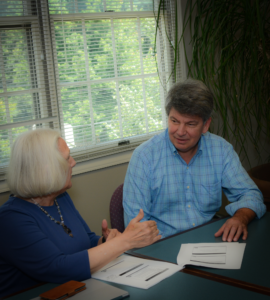
Shaping Communities Through Community Development Block Grant – Infrastructure Funding
Act Today, Deadlines Quickly Approaching
 At McGill, we pride ourselves on our ability to help shape communities – it is, indeed, our tagline. McGill was founded in Western North Carolina in 1984 and has been assisting communities – large and small – ever since, now serving a four-state (North Carolina, Tennessee, Virginia, and South Carolina) region. One of our core services includes helping our local government clients secure funding for capital projects. This is especially important for smaller towns and counties, as they often need financial aid to complete critical water and sewer projects to meet regulatory drivers and the growth needs of their communities. In these instances, we assist them with pursuing funding from intentionally directed programs, such as the Community Development Block Grant – Infrastructure (CDBG-I) program.
At McGill, we pride ourselves on our ability to help shape communities – it is, indeed, our tagline. McGill was founded in Western North Carolina in 1984 and has been assisting communities – large and small – ever since, now serving a four-state (North Carolina, Tennessee, Virginia, and South Carolina) region. One of our core services includes helping our local government clients secure funding for capital projects. This is especially important for smaller towns and counties, as they often need financial aid to complete critical water and sewer projects to meet regulatory drivers and the growth needs of their communities. In these instances, we assist them with pursuing funding from intentionally directed programs, such as the Community Development Block Grant – Infrastructure (CDBG-I) program.
Lifeline for Small Communities
 CDBG is a federal Housing and Urban Development (HUD) program. Through the HUD small cities program, the state of North Carolina receives CDBG funding for variety of needs, including infrastructure (CDBG-I) improvements for low-income neighborhoods. It is a lifeline for communities that cannot afford to pay as they go on their most critical needs. The program aims to create healthy living environments through financing public water and sewer infrastructure, along with mitigating public and environmental health problems, in areas where the percentage of low- to moderate-income (LMI) persons is at least 51 percent.
CDBG is a federal Housing and Urban Development (HUD) program. Through the HUD small cities program, the state of North Carolina receives CDBG funding for variety of needs, including infrastructure (CDBG-I) improvements for low-income neighborhoods. It is a lifeline for communities that cannot afford to pay as they go on their most critical needs. The program aims to create healthy living environments through financing public water and sewer infrastructure, along with mitigating public and environmental health problems, in areas where the percentage of low- to moderate-income (LMI) persons is at least 51 percent.
McGill has a successful track record helping communities launch projects and secure funding to support their critical infrastructure needs. For example, just this year, we secured close to four million dollars in CDBG-I grants for three communities in North Carolina: the Town of Hoffman, the Town of Clyde, and the Town of Andrews. These funds will provide significant wastewater improvements and enhance water and wastewater infrastructure in all three communities.
Do You Have a Project in Mind?
In North Carolina alone, the Department of Environmental Quality had $25.2 million in available money for the 2020 funding round. Units of local governments, town, cities, and villages with populations of less than 50,000 and counties with populations of less than 200,000, are eligible to apply.
Consider the following:
 1. Does your project meet one of these three required national objectives?
1. Does your project meet one of these three required national objectives?
- Benefit low- to moderate-income people
- Aid in the prevention of slums and blight
- Meet a need having a particular urgency
2. Is your project either a water or wastewater project?
3. Can you show, through maps and boundaries, that an entire project area will be served?
4. Would you estimate that the project area will meet the 51 percent LMI requirement?
Act Today to Review Your Project
If you answered yes to the above questions, our grant management team welcomes the opportunity to sit down with you to review your project and discuss the likelihood of it receiving funding. Take action today by calling Joel Storrow, Principal / Past President, at 812.712.0286 to talk over your options.